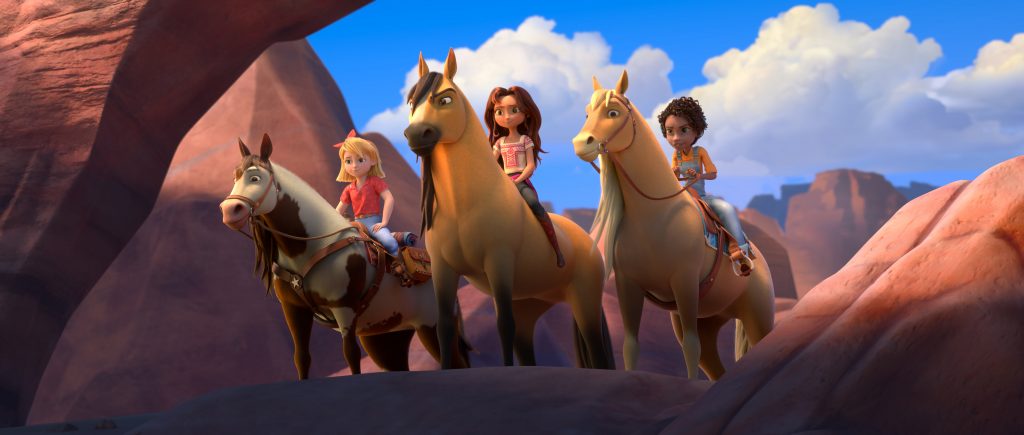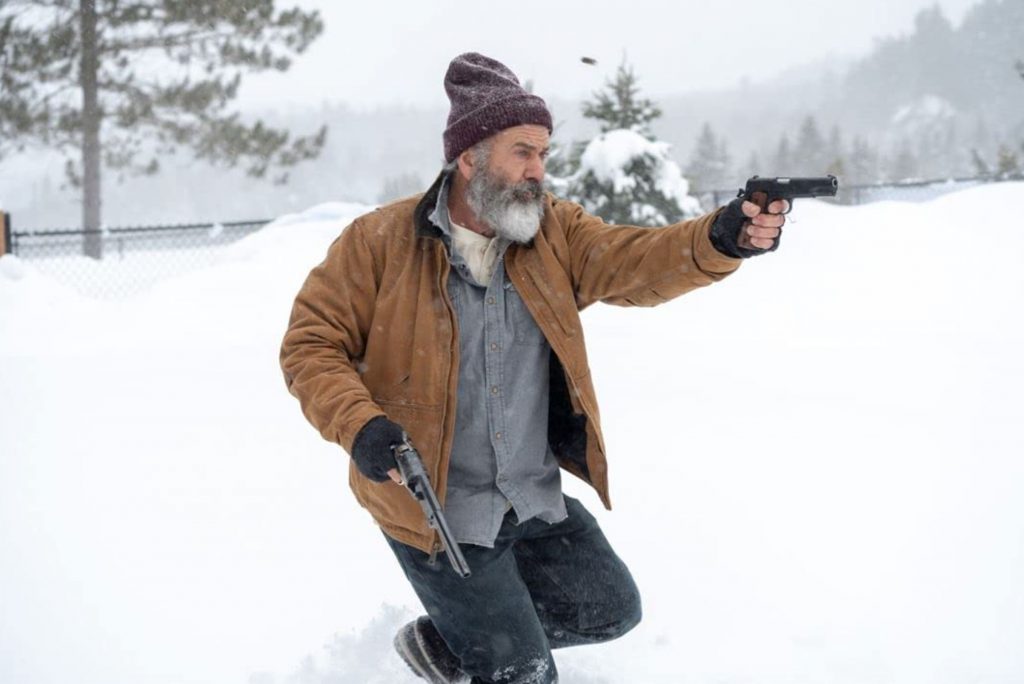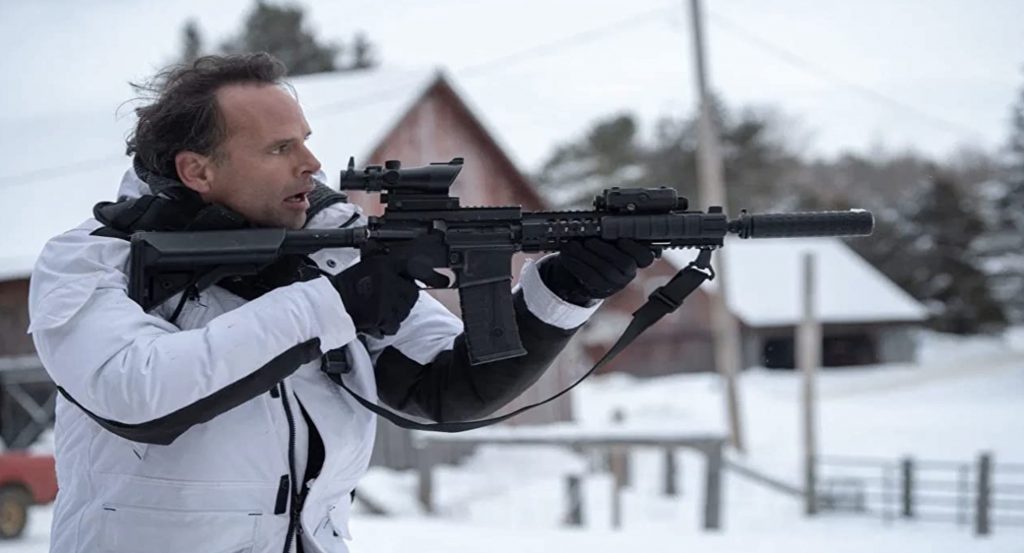June 4, 2021
by Carla Hay

Directed by Elaine Bogan; Co-directed by Ennio Torresan
Culture Representation: Taking place sometime in the early 1800s or mid-1800s in an unnamed Southwestern part of the United States, the animated film “Spirit Untamed” features a predominantly white cast of characters (with a few African Americans and Latinos) representing frontier people living in the Wild West.
Culture Clash: A 12-year-old girl defies her father’s orders to ride a horse, and she teams up with two other girls to fight bandits who have stolen a team of horses led by an intelligent mustang stallion named Spirit.
Culture Audience: “Spirit Untamed” will appeal primarily to people who are fans of the Netflix animated series “Spirit Riding Free,” on which this movie is based, but many viewers might be unimpressed with the bland storyline, unremarkable animation and an origin story that isn’t very original.

In this lukewarm origin story for Netflix’s “Spirit Riding Free” animated series, the animated feature film “Spirit Untamed” does a watered-down and unimaginative Disney Princess version of “Spirit Riding Free.” All of the elements of a Disney Princess story are there: The 12-year-old female protoganist has an absentee or dead mother. She has “daddy issues” with a father or father figure who’s usually overprotective. And she fights gender biases that expect girls to not be as adventurous as boys.
However, “Spirit Untamed” is not a Disney film. It’s from DreamWorks Animation, which has been trying for years to play catch-up to Disney’s dominance of the animated movie business. Unfortunately, “Spirit Untamed” is not an example of a highly creative or visually stunning animated film. It’s so mediocre and formulaic that it doesn’t even look like a movie that needs to be seen in a movie theater.
And it’s disappointing that the movie isn’t better, because “Spirit Untamed” is a rare animated film released in cinemas that has a female-majority team of directors, writers and producers. The movie is the feature-film debut of Elaine Boga, who has previously directed episodes of DreamWorks Animation series such as “3Below: Tales of Arcadia,” “Trollhunters: Arcadia,” “Dragons: Race to the Edge” and “DreamWorks Dragons.” Ennio Torresan co-directed “Spirit Untamed,” which was written by Kristin Hahn, Katherine Nolfi and Aury Wallington.
When a TV series has a feature-film spinoff that’s released in cinemas, it should deliver a story that’s epic, so that people will feel like the story was worth seeing on a theater big screen. “Spirit Untamed” just looks like a story from some leftover script ideas that didn’t make it into the show’s pilot episode, but with different (bigger-named) actors voicing the main characters in the movie. Just because the movie had a bigger budget and more famous actors than the TV series doesn’t mean that the quality is any better than the TV series.
“Spirit Riding Free” is based on the 2002 DreamWorks Animation Film “Spirit: Stallion of the Cimarron,” which hardly has anything in common with the TV series and “Spirit Untamed,” except for the mustang stallion character Spirit, an intelligent horse that refuses to be tamed and held captive. “Spirit: Stallion of the Cimarron” is told from the horse’s point of view (with Matt Damon providing the narration as the voice of Spirit) and it’s a very male-centric movie.
In “Spirit Riding Free,” the main protaganist is 12-year-old Fortuna Esperanza Navarro Prescott, nicknamed Lucky. She’s a slightly rebellious, very adventuresome girl who has moved from a big city to a small frontier town called Miradero in an unnamed part of the Southwestern United States. The story is set in the early 1800s or mid-1800s, and where Lucky is living is considered a Wild West territory that has not yet been become an official state in the United States.
In the TV series, Lucky (who is an only child) lives with her widowed father Jim Prescott Jr. and her aunt Cora Prescott. She befriends a mustang stallion named Spirit, who heads a team of other wild horses. In the first episode of “Spirit Riding Free,” Lucky rescued Spirit from a group of horse wranglers. The “Spirit Untamed” movie is essentially the same story, except there’s more background information about how the death of Lucky’s mother has affected the family.
“Spirit Untamed” also has the same sidekicks for Lucky: two girls who are about the same age as she is: Prudence “Pru” Granger and Abigail Stone. Pru has a horse named Chica Linda, while Abigail has a horse named Boomerang. Spirit doesn’t want to be owned by anyone, but Lucky is one of the few people who can ride Spirit without Spirit trying to knock them to the ground. In “Spirit Riding Free,” Lucky goes to school. In “Spirit Untamed,” the closest reference to school is near the beginning, when a homeschooled Lucky is still living in the city and she’s reluctant to do homework that was assigned to her by her math tutor.
Viewers will have to suspend disbelief or get used to how this “Spirit” world isn’t historically authentic in many ways. The “Spirit” world is supposed to be set in the early 1800s or mid-1800s, before cars and electricity existed, but many of the characters in the movie dress, talk and use a few things to make it look like this story takes place in the 20th century. For example, in “Spirit Untamed,” Abigail blows and pops some bubble gum, which wasn’t invented until 1928.
The movie’s characters (especially the women and girls) also wear their hair and clothes that look more like they’re in a TV ad for Levi’s jeans, not living in an era before electricity was invented. Yes, many people watching this movie will be children who are too young to know better. But a lot of viewers will be people who are old enough to know that these characters are too modern for the 1800s. And these observant viewers won’t like how this movie was made as if the filmmakers think that people are too stupid to notice.
The historical inaccuracy in “Spirit Untamed” is the least of this movie’s problems. Because “Spirit Untamed” is just a longer retread of the first episode of “Spirit Riding Free,” it comes across as quite lazy that the screenwriters couldn’t come up with a more original story for this movie. “Spirit Untamed” opens with the death of Lucky’s mother Milagro Navarro (voiced by Eiza González), who died when she was thrown off of the horse that she was riding in a rodeo. Lucky’s father Jim Prescott Jr. (voiced by Jake Gyllenhaal) witnessed this death, which happened when Lucky was a baby.
Jim was apparently so grief-stricken that he didn’t think he could raise Lucky as a single father. And so, Lucky (voiced by Isabela Merced) was raised in the city by Jim’s sister Cora (voiced by Julianne Moore), while Jim stayed in Miradero. It’s shown near the beginning of the movie that Jim’s father James Prescott Sr. (voiced by Joe Hart) is running for governor. The Prescotts seem to be a well-to-do family because they can afford a private tutor for Lucky.
However, Jim and his father are no longer on speaking terms because James Prescott Sr. is not impressed with what he thinks is Jim’s lack of amibition and small-town life. And it’s implied, but not really said out loud, that Jim lost respect from his father because Jim handed off the responsbility of raising Lucky to Cora. And there are hints that the death of Lucky’s mother hasn’t been discussed enough in the family, so the emotional wounds still cut deep.
These are family issues that could be too heavy for an animated film that’s made for children as a large part of the movie’s target audience, but these issues could have been explored better in “Spirit Untamed.” It can be done: Pixar Animation Studios (owned by Disney) has built its brand on making animated films about heavy life issues while still being entertaining to people of all ages. Instead, “Spirit Untamed” just glosses over these issues in a shallow way.
Lucky is shown sulking on a window ledge because she wants to go to a party that her grandfather is having for his political campaign. However, Cora explains that Lucky is not allowed to go to the party because Lucky has to study and work on her math lessons. There’s a squirrel named Tom that Lucky has befriended. And somehow, this squirrel ends up at the party, lands on James Prescott Sr.’s face, and a newspaper photographer caught the amusing spectacle on camera. (This party is never shown in the movie.)
A photo of the squirrel on James Prescott Sr.’s face ends up on the front page of the newspaper. And apparently, he was so humiliated and angry about this squirrel, that he blamed Lucky and sent her away to visit his estranged son Jim (Lucky’s father) in Miradero for a few months. It’s a clumsy way to explain why Lucky and Cora have to go to Miradero, but there it is in this movie.
While riding by train to Miradero, Lucky looks outside a window and sees Spirit for the first time, when he’s running with his team of horses in a nearby field. She’s immediately drawn to this horse and can’t take her eyes off of him. The horse makes eye contact with her, so even if viewers know nothing about the “Spirit” franchise before seeing this movie, it’s obvious that Spirit and Lucky will end up becoming friends.
At one point in the journey, Lucky is at the back of the train and leaning over a rail to get a better view of the scenery. She almost falls over, but she’s caught in time by a rough-looking man named Hendricks (voiced by Walton Goggins), who is traveling with four other men on the train. (Hendricks’ unnamed companions are voiced by Jerry Clarke, Gino Montesinos, Lew Temple and Gary Anthony Williams.) Cora and Lucky thank Hendricks for preventing Lucky from having a dangerous fall. Hendricks seems polite, but it’s soon clear that he’s going to be the story’s chief villain.
Shortly after arriving in Miradero, where people immediately tell Lucky how much she looks like her mother, Lucky has an awkward reunion with her father Jim, who lives in a cluttered house that looks like it hasn’t been cleaned in a while. Jim doesn’t endear himself to Lucky right away when he sheepishly admits that he forgot the date that Lucky and Cora were arriving, so he wasn’t fully prepared when they showed up at his door.
Most of the house is a jumbled mess, but Jim has thoughtfully redecorated a bedroom where Lucky will be staying. It’s the only neat and clean room in the house, but Jim has gone overboard in decorating the room with strawberry art. The wallpaper even has strawberries on it. He explains to Lucky that she used to love strawberries as a baby, so that’s why the room has a strawberry theme.
Lucky doesn’t think the room suits her taste, but there’s nothing she can do about it. And besides, the plan is that she and Cora will only be visiting for a few months. Behind her bedroom, Lucky finds a secret room with mementos and other personal items that belonged to her late mother Milagro. It’s here that Lucky discovers how much her mother was a well-regarded rodeo horseback rider.
Meanwhile, because of the way that Milagro died, Jim is strict in forbidding Lucky to ride any horses. And, of course, everyone watching this movie knows she’s going to break that rule. Cora takes Lucky to a rodeo, where she meets Pru (voiced by Marsai Martin), who’s a skilled horseback rider. Pru’s father Al Granger (voiced by Andre Braugher) is there too.
Later, Lucky meets a hyper kid, who’s about 7 or 8 years old, named Snips Stone (voiced by Lucian Perez). And it’s because of Snips that Lucky meets his older sister Abigail Stone (voiced by McKenna Grace). Abigail thinks that Snips is a brat, so there are a few bizarre and unnecessary scenes where Abigail has him tied up, because she doesn’t want him pestering her.
The capitivity abuse of Snips is supposed to be funny, but it comes across as cruel. Imagine the outrage if a boy had his sister tied up or hanging by ropes, even in an animated film. Snips and Abigail’s parents are never seen in “Spirit Untamed.” It’s another glaring omission from the film that doesn’t explain why Abigail and Snips don’t seem to have any adult supervision.
Abigail is actually more annoying than Snips in this movie. She brings a banjo with her and starts singing at inopportune moments. Abigail, who also tends to talk too much, has it stuck in her head that she, Pru and Lucky should be in a band. Lucky and even Jim have a few moments where they break out into song too. The movie’s original songs—including “Better With You” (peformed by Merced) and “Fearless” (performed by Merced and González)—are mediocre and forgettable.
Pru has the same deadpan sarcasm that’s in the “Spirit Riding Free” TV series. Lucky and Pru are smarter than Abigail, while Lucky is the biggest risk-taker, the most persistent and the most optimistic of the three friends. Just like in the TV series, Pru, Abigail and Lucky see that the first letters of their first names can be spelled as PAL. And they have friendship bracelets with the world PAL engraved on it.
Hendricks and his gang of horse wranglers are in Miradero because they’ve been hired to break/train some wild horses that were found by Pru’s father Al. Spirit is one of these wild horses, and that’s how Lucky sees Spirit and his team again and gets to know the horses better. Every time Lucky sees Spirit, she can’t resist letting him loose from the ropes that bind him to the corral.
Al is married to Pru’s mother, but Pru’s mother is never seen in “Spirit Untamed.” In fact, Cora is the only “mother figure” or adult female character with a significant speaking role in this movie. The lack of adult female characters with major roles in this story somewhat undermines the feminist intentions of the movie, which basically makes Lucky, Pru and Abigail look like the adolescent Wild West version of Charlie’s Angels when they decide to chase down the bad guys.
That’s because Hendricks and his cronies are really there to steal Spirit and the rest of the wild horses, so that these thieves can auction off the horses into a life of captivity and strenuous labor. And it’s up to Lucky, Pru and Abigail to save these horses. Spirit manages to escape, so Pru rides him on this mission to hunt down the thieves. Everything that follows is entirely predictable, with nothing that hasn’t been seen already in a “Spirit Riding Free” episode.
There are the seemingly impossible horse leaps from one cliff to the next. There are moments when it looks like the villains are winning because they outnumber the heroes. There are the scenes where horses get lassoed and try to break away and seem to be in pain. We all know how this movie is going to end anyway, so there’s no suspense, but the filmmakers should have at least come up with better obstacles for the heroes than the same old scenarios.
All of the voice actors do serviceable jobs in the roles, but no one is going to win any animation awards for “Spirit Untamed.” Toward the end, the movie gets a bit too slapstick for its own good. It’s as if the filmmakers didn’t know if the movie should be more of an action drama or more of an action comedy.
Coming from a major animation studio like DreamWorks, “Spirit Untamed” should’ve had outstanding visuals, but the movie looks incredibly generic. The screenplay should have offered more suspense and a less superficial look at the Prescott family dynamics to give more emotional depth to Lucky’s backstory. Now that Lucky’s origin story has been established in a feature film, if there’s another “Spirit” movie based on the “Spirit Riding Free” series, let’s hope that the end results look like money well-spent instead of a cheap knockoff of better-quality animated films.
DreamWorks Animation released “Spirit Untamed” in U.S. cinemas on June 4, 2021.


